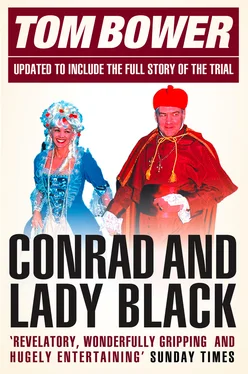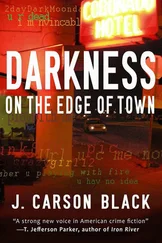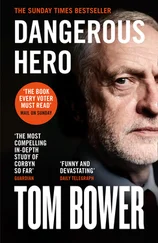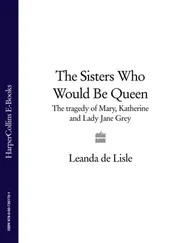Argus’s operations were fundamentally dishonest. In their private capacity the company’s directors bought shares in companies involved in the media, catering, retail, chemicals, forestry and agriculture, including Massey-Ferguson, one of the world’s biggest farm equipment manufacturers. They then resold those same shares to Argus, at a profit. The casualties of this insider dealing were Argus’s public shareholders. The directors’ dishonesty, as George Black had impressed upon his son, was compounded by another ruse.
Argus controlled assets worth $4 billion, but that control did not reside with the shareholders. Instead, the company was run by the six principal shareholders of a private company called Ravelston, named after a Scottish estate owned by McDougald’s ancestors. Before his dismissal, George Black had bought 22.4 per cent of Ravelston’s shares; McDougald and Phillips each held 23.6 per cent. Aware of George Black’s astute investment and his acute understanding of the Argus directors’ subterfuge, McDougald had, from an early stage, understood the benefits of flattering Conrad Black.
In 1965, on Conrad’s twenty-first birthday, Bud McDougald gave the precocious young man a painting of Napoleon and, unprecedentedly, membership of the Toronto Club, the meeting place for the city’s elite, entry to which was zealously controlled by McDougald himself. The advantages for Conrad Black were remarkable. Toronto’s commercial life was fixed by the club’s members as they ate, drank and played within the protected building. Finance for their deals was supplied by Canada’s leading financial institution, the Canadian Imperial Bank of Commerce (CIBC), substantially influenced by McDougald, who was a director. To help his protégé’s career McDougald arranged for Black to become, at thirty-two, the youngest director in the bank’s history. That generosity split Conrad’s loyalties. Despite his father’s anger, he practically worshipped McDougald’s mystique and power. While puffing a cigar in the Toronto Club, Black would enjoy repeating McDougald’s homily, ‘If these bankers had any brains, we’d be lending them money and they’d be getting rich, instead of the other way round.’
Although George Black resented McDougald’s success, he retained his stake in Ravelston. At some stage, he calculated, there would be an opportunity for revenge and profit. That ambition was inculcated into Conrad Black. Steeped in the minutiae of Argus’s personality conflicts and financial dubieties, Conrad emerged with a sophisticated understanding of the inherent deception of the way in which the company was run. Argus rarely held more than a 25 per cent stake in a company, yet McDougald and Taylor behaved like the proprietors, as if they were the owners of the whole lot. Similarly, by assertion and performance, they intimidated Argus’s minority shareholders into believing that they were entitled to behave as the proprietors of the whole company. Their successful intimidation of the little people was a seminal inspiration to Conrad Black.
Besides his father and Bud McDougald, there was a third formative influence on Conrad Black: the lessons of history. Even before his teens, Conrad admired from his copious reading the rise from obscurity to immortal fame of giants who irreversibly changed mankind’s fate. Egoistic self-righteousness, he realised, could overcome adversity, and popular acclaim bestowed permanent glory. The mere appearance of Napoleon or Abraham Lincoln among soldiers and supporters had raised hopes and entrenched loyalty to the leader. History’s heroes, Black learned, exploited their opponents’ weaknesses, outwitted their deceptions, manipulated their ambitions and assembled a coalition of allies to secure victory. Nurturing his own fantasies of eventually standing in the limelight and enjoying similar grandeur, he awaited his chance for revenge. Patience, planning and perfidy would be required to destroy his father’s tormentors.
On most days George Black would awake in a melancholic daze at lunchtime, spend the afternoon speculating on the markets, and after dinner would watch television while drinking himself into a stupor before his long night-time conversation with Conrad. Just before daybreak he would climb the stairs to his bedroom. His wife Betty, a sports enthusiast from the Riley family, whose wealth came from insurance and finance, had little in common with her husband. In recent years, barely tolerating a man who rarely emerged from his house or met visitors, she had condemned her husband as a self-righteous snob and disappeared into her own rooms. Their unpleasant co-existence was interrupted in September 1975, when Jean Black was diagnosed with terminal liver cancer.
Eight months later, Conrad, Monte, his elder brother by four years, and their father, accompanied by a nurse, flew with the dying woman in a private plane loaned by Argus to Bermuda, which Jean had always dreamt of visiting. Shortly after their return, on 19 June 1976, she died. George Black declared himself too ill to stand by her grave. After the funeral the mourners returned to the family house, to be told that George was too sick to appear at the wake. Only his closest friends remained when he finally emerged, depressed and showing little will to live. ‘Are you planning a trip during the summer?’ asked one, Douglas Bassett. ‘Yes,’ replied Black. ‘To the dentist in late July.’
Ten days later, after another night-time discussion with Conrad, George Black slowly climbed the stairs. As he reached the top, his son heard cracking wood, and saw his father fall over the banister onto the ground floor. 3 Carried by Conrad into the library, George Black said that he no longer had the will to live. ‘Life is hell,’ he told his son as they awaited the doctor. ‘Most people are bastards, and everything is bullshit.’ The doctor’s diagnosis was bleak. His father, Conrad was told, was unlikely to survive. Despite the prognosis, Conrad returned to his own home and watched a Charlie Chan film. His viewing was interrupted by a telephone call. George Black, the doctor announced, was dead. Many, occasionally including his son, believed that he had committed suicide. At thirty-two, Conrad Black was an orphan with a purpose.
Toronto’s financial leaders gathered for George Black’s funeral. The pall bearers, who included all Ravelston’s directors, were led by Bud McDougald and E.P. Taylor. Conrad watched McDougald with particular interest. While he admired ‘the ultimate Canadian tycoon’, 4 he recognised that he represented Canada’s ‘corporate rot’, and that his fortune had been earned in a uniquely dishonest manner called ‘tollgating’. 5 Conrad’s later pious denunciation of the legend’s ‘venality and self-delusion’ at his father’s graveside did not undermine his endorsement of McDougald’s crushing piety: ‘Some are chosen, some are not.’ In the jungle, Conrad Black was committed to stand among the chosen.
Bud McDougald, like Ravelston’s other major shareholders, Black noted, had no children. Their wives were uninterested in business. Those circumstances would be his opportunity. Ingratiating himself with the older directors was not a chore, but rather an investment. Among Conrad Black’s skills was flattering old, lonely, rich people.
After their father’s funeral, Conrad and Monte Black called on Bud McDougald, who controlled the fate of the two young men’s assets. To Conrad’s relief they were ‘welcomed most graciously’. Whereas Conrad had condemned McDougald as a ‘snob, bigot … and an unlearned reactionary’ who had succumbed to ‘jet-addicted decadence’, on that particular day he encountered ‘an elegant and considerable figure’. 6 After a brief discussion the brothers emerged with a satisfactory deal. Conrad was given a directorship of Argus and Ravelston, while Monte was given directorships of other companies. As if to confirm his younger brother’s intellectual superiority, Monte agreed that Conrad should inherit their parents’ grand house amid seven acres in Bridle Path’s Park Lane Circle. The house matched Conrad’s ambitions. Unlike Monte, an unthreatening bon vivant with a fondness for big cigars, fast cars and good food, Conrad’s dream was to join the establishment and to control an empire matching those of Canada’s principal families, including the Eatons, the owners of the country’s dominant department store chain; the Westons, who owned a food and retail business; the Bronfmans, whose fortune was built on alcohol during the Prohibition; the Thomsons, the media family whose assets included the Times newspapers in Britain; and the investors Paul Desmarais of Power Corporation and Hal Jackman, the inheritor of a large investment fund. 7 Stuck on the periphery, Conrad Black hoped to use his inheritance to become a power on Bay Street and a member of Toronto’s financial mafia. His life over the previous thirty-two years had been a preparation for that struggle.
Читать дальше












